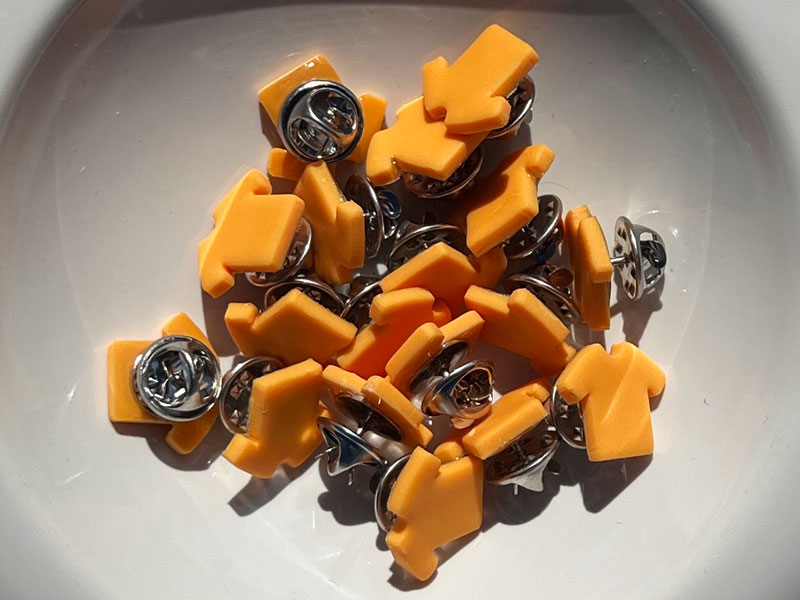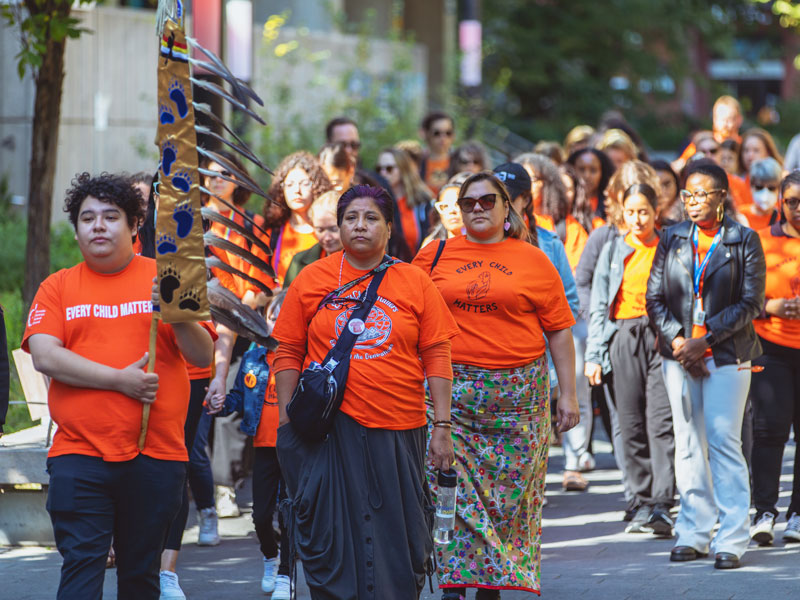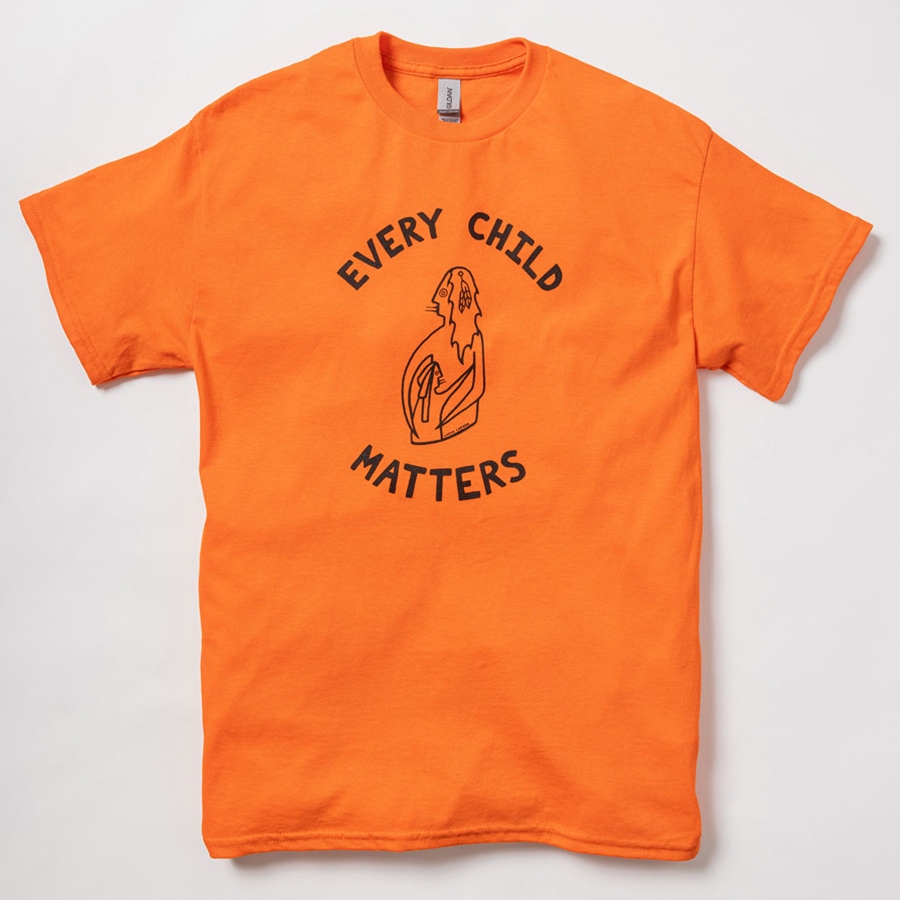Ozaawaa Babigoyaan Giizhigad / Orange Shirt Day
- Date
- September 30, 2024
- Time
- 9:00 AM EDT - 4:00 PM EDT
- Location
- Various locations on campus
- Open To
- Students, faculty, staff and community members
- Contact
- Indigenous events team indigevents@torontomu.ca

Ozaawaa Babigoyaan Giizhigad / Orange Shirt Day and the National Day for Truth and Reconciliation occur annually on September 30. It is a commemorative day of recognition and awareness-raising about the impacts of Canada's Indian Residential School system and government policy imposed on Indigenous Peoples in Canada. Ozaawaa Babigoyaan Giizhigad / Orange Shirt Day originated from the story of Phyllis Webstad (external link) , who is a residential school survivor.
What to expect
All TMU community members are invited to join the Ozaawaa Babigoyaan Giizhigad / Orange Shirt Day events to honour and commemorate the survivors of Indian Residential Schools and remember the children who did not return home.
Beginning at 9 a.m., events include a virtual Truth and Reconciliation presentation, hands-on craft sessions and a silent memorial walk. We also invite all participants to join Yellowhead Institute’s event Yellowhead Fire - Truth and Land Back (external link) at 1 p.m.
Attendees are encouraged to wear orange to show solidarity and respect to survivors and their families.
Registration is encouraged.
Agenda
9 a.m. to 10 a.m. | Truth and Reconciliation presentation hosted by Woodland Cultural Centre
Location: Online via Zoom
This comprehensive presentation by the Woodland Cultural Centre (formerly the Mohawk Institute Residential School) covers topics from the imperial context, from Canada's Indigenous policy, the Indian Residential Settlement Agreement, to the United Nations Declaration on the Rights of Indigenous Peoples (UNDRIP). Participants will have the opportunity to gain a deeper understanding of the TRC's final report, its 10 principles and 94 calls to action. The presentation will offer insight into the progress report, examples of implementations, personal acts of reconciliation, barriers to reconciliation and an explanation of what reconciliation is not.
10 a.m. to 12:30 p.m. | Hands-on crafting sessions
Location: 8th floor, Student Learning Centre (SLC) (341 Yonge St.)
Join one of four crafting sessions, including an Orange Shirt Day Clay Pin workshop with Assinewe Jewelry (external link) . Participants can also create their own buttons, mini orange shirt flags to carry on the memorial walk, and more.

1 p.m. | Yellowhead Fire - Truth and Land Back hosted by the Yellowhead Institute
Location: Online via Zoom or in-person at Centre for Urban Innovation (CUI) (44 Gerrard St. E.)
Join the Yellowhead Institute on the launch day of Yellowhead's Land Back course with a short film screening and panel discussion on Truth and Land Back. Learn more and register for Yellowhead Fire - Truth and Land Back (external link) .
3:15 p.m. to 4 p.m. | Memorial Walk
Location: Meet in the main lobby of Jorgenson Hall (JOR) (380 Victoria St.)
As you walk, reflect on what it would feel like to attend an institution like TMU where you couldn't speak your language, practice your beliefs or see your family. Consider the experience through the eyes of a child as young as four or five.
At the Normal School façade, participants will be invited to place their paper orange shirts in the soil, symbolizing the contrasting experiences of Indigenous and non-Indigenous students. A clean-up team will recycle these items afterward.

Accessibility
This event is wheelchair accessible. TMU is committed to the accessibility and inclusion of persons with disabilities. If you require any additional accessibility accommodations to ensure your full participation, please let us know on the registration form or email Crystal Osawamick, manager of Indigenous events and special projects, at crystal.osawamick@torontomu.ca.
This event is part of reconciliation at TMU
In 2015, the Truth and Reconciliation Commission (TRC) of Canada released the report Honouring the Truth, Reconciling for the Future (external link) , which outlines the history and legacy of Canada’s residential school system and 94 Calls to Action to redress the legacy of those schools and advance the process of Canadian reconciliation.
In response to the TRC’s Education Calls to Action, after two years of community consultations, TMU released the Truth and Reconciliation Community Consultation Summary Report and established the TRC Strategic Working Group, which structured much of TMU’s work toward addressing the Calls to Action.
Today, TMU remains committed to increasing awareness of Indigenous histories, worldviews and cultures and continues to promote inclusion of Indigenous persons and perspectives at the university and foster respectful dialogue and relationships between both Indigenous and non-Indigenous students, faculty, staff and community members. Learn more about TMU’s ongoing work toward Truth and Reconciliation.
This event is organized by a collective of Indigenous and non-Indigenous colleagues, led by Crystal Osawamick
The committee includes staff from Office of the President; University Events And Ceremonies; Office of the Provost; Office of the Vice-President, Equity and Community Inclusion; Indigenous Initiatives; Gdoo-maawnjidimi Mompii Indigenous Student Services; Alumni Relations; Career, Co-op and Student Success; Centre for Excellence in Learning and Teaching; Indigenous Education Council; Lincoln Alexander School of Law; School of Early Childhood Studies; Student Affairs; Student Learning Centre; Student Life and Learning Support and TMU Libraries.
Crystal Osawamick is the manager of Indigenous events and special projects at TMU.
Questions?
If you have any questions, please email Crystal Osawamick, manager of Indigenous events and special projects, at crystal.osawamick@torontomu.ca.
(Photos: Nadya Kwandibens)
Support for Indigenous students, faculty and staff
Indigenous students can access culturally supportive programs and services, including peer support groups and Indigenous traditional counselling through Gdoo-maawnjidimi Mompii Indigenous Student Services.
The Centre for Student Development and Counselling (CSDC), in partnership with Indigenous Initiatives and Indigenous Student Services in the OVPECI, offers individual counselling support to Indigenous students. To book an appointment, contact Lisa LaFreniere at lisa.lafreniere@torontomu.ca and Eden Abraham at eden.abraham@torontomu.ca.
Good2Talk (external link) is a free, confidential and anonymous service for post-secondary students for 24/7 professional counselling. Good2Talk also provides mental health information and referrals for mental health, addictions and well-being. Access their services immediately by calling 1-866-925-5454 or texting “GOOD2TALKON” to 686868.
Through the university’s Employee and Family Assistance Program (EFAP), Telus Health, Workplace Wellbeing Services and Indigenous Initiatives in the OVPECI have arranged for Michael Diotte (Indigenous trauma counsellor) to be available for individual, confidential, virtual or in-person counselling (Michael is located in Oshawa area).
Indigenous employees (who have self-identified through the Employee Diversity Self-ID Program) can call the Telus Health Care Access Centre at 1-844-880-9142 and request an appointment with Michael.
Indigenous employees who have not self-identified through the Employee Diversity Self-ID Program and wish to access support through Life Works are also eligible for this service. If you have any questions about your eligibility for EFAP services, contact Jennifer Alefounder (Director, Workplace Wellbeing) at jennifer.alefounder@torontomu.ca. Jennifer continues to be a member of the working group that oversees the ongoing resources and support of Indigenous employees.
The Indian Residential School Survivors Society is a provincial organization that provides essential services to residential school survivors and families experiencing intergenerational trauma. For immediate crisis support, please call 1-866-925-4419, 24 hours a day, seven days a week.

There are several ways to show your support and order your shirt for Orange Shirt Day events. We strongly recommend that community members purchase orange shirts from Indigenous-owned businesses and retailers that give a significant percentage of proceeds to Indigenous charities and organizations.
This year, TMU's Campus Store is selling orange Every Child Matters t-shirts in partnership with Indigenous Initiatives in the Office of the Vice-President, Equity and Community Inclusion (OVPECI). The shirts were designed by Lucia Laford, with 100 per cent of profits are donated to the Orange Shirt Society (external link) .